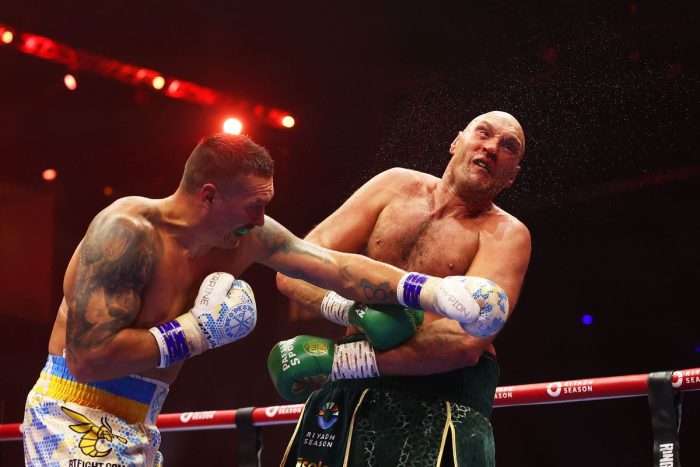On Sunday, fans and lovers of boxing witnessed Oleksandr Usyk emerge victorious over Tyson Fury in the first undisputed heavyweight match since 1999.
It was indeed a glorious day.

The arena was filled with thousands of fans and supporters screaming and cheering Usyk and Fury.
As the boxers exchange blows, the cheering crowd erupted in joy like spectators of the ancient Roman games, hungry for more.
After hours of suspense, Usyk finally defeated Fury.
Heavyweight Champs
Within the complex network of boxing-sanctioning bodies, the victor in Riyadh ascended to the esteemed position of the first four-belt heavyweight champion.
Usyk’s induction into an exclusive circle serves as a testament to the significance of athleticism, resilience, and astuteness, required for attaining and preserving undisputed champion status, both within the ring and in broader contexts.
Here, in this article, we have listed six undisputed heavyweight champs you should know.
Meet The Undisputed Heavyweight Champs:
Jack Dempsey
Dempsey emerged as the undisputed heavyweight champion at the dawn of 1921.
He was backed by the official recognition of the American National Boxing Association and the influential New York State Athletic Commission.
Known as the “Manassa Mauler,” Dempsey’s fists were lethal weapons, with his right hand earning the fearsome nickname “Iron Mike” and his left hook famously dubbed “Big Bertha.”
His conquest of Jess Willard in 1919 propelled him into the realm of ‘lineal’ world champion, solidifying his status as the ultimate contender in boxing’s hierarchy.
With his newfound official recognition, Dempsey’s inaugural sanctioned defense against Georges Carpentier became a historic event, marking the advent of the million-dollar fight era.
Despite subsequent challenges, including two defeats to Gene Tunney, Dempsey’s legacy as a formidable champion endures in the annals of boxing history.
Joe Louis
Louis became the heavyweight champion in 1937.
In fact, he broke a long-standing racial barrier in boxing.
His reign lasted from June 1937 to March 1949, spiced with an unprecedented 26 successful title defenses.
Louis’s victory over James Braddock marked the end of an era dominated by white champions, with his most memorable triumph being a revenge knockout of Max Schmeling in 1938.
Known for his intelligence, composure, and devastating punching power, Louis left an enduring legacy in the sport, epitomized by his famous quote: “Everyone has a plan until they’ve been hit.”
Rocky Marciano
Who reigned from September 1952 to April 1956, and defended his heavyweight title six times during his illustrious career? Rocky Marciano.
Despite an unremarkable start in amateur boxing and a detour through baseball with the Chicago Cubs, Marciano turned professional just before his 25th birthday in 1948.
With an impeccable record of 49 wins in as many fights, including 43 by knockout, Marciano’s stature at 5ft 10in belied his ferocious punching power.
Known for his relentless determination and resilience, he earned a reputation as a thunderous puncher in the ring.
Marciano’s crowning moment came at age 29 when he secured his title with a dramatic knockout of Jersey Joe Walcott in the final round, courtesy of his signature “Suzie Q” straight right.
After defeating legends like Joe Louis and knocking out Walcott in their rematch, Marciano retired undefeated at 32, culminating his career with a victory over Archie Moore at the age of 42.
Muhammad Ali
Renowned as “The Greatest,” Ali held the heavyweight title during three distinct periods.
From February to September 1964, February to April 1967, and from October 1974 to February 1978, accumulating 10 unified defenses.
Ali’s legacy as a champion is marked by both triumph and controversy.
His refusal to serve in the Vietnam War led to a three-year exile from boxing, during which he lost his undisputed status.
However, his return to the ring in 1970 reignited his career, culminating in iconic victories over Sonny Liston, Joe Frazier, and George Foreman.
Ali’s defiance extended beyond the ring.
He boldly embraced his identity and principles, famously declaring, “I’m so mean, I make medicine sick,” and rejecting his birth name, Cassius Clay.
Ali was not without setbacks.
This includes defeats to Leon Spinks and Larry Holmes in his later years.
However, Ali’s impact transcended boxing, earning him admiration worldwide.
Joe Frazier
Frazier held the heavyweight title from February 1970 to January 1973.
He engaged in a legendary trilogy with Muhammad Ali that captivated the boxing world.
Known as “Smokin’ Joe,” Frazier’s aggressive style and relentless pressure made him a formidable opponent.
His signature left hook, dubbed the “heat-seeking missile,” proved devastating, particularly in their first encounter, “The Fight of the Century,” where he famously floored Ali.
Despite losing his title to George Foreman in 1974, Frazier’s rivalry with Ali continued to define his career.
In their rematch, Ali employed tactical brilliance to secure victory.
Also Read: Tyson Fury And Oleksandr Usyk Reportedly Have Agreed To Face Each Other
Furthermore, their final bout, the “Thrilla in Manila,” showcased Ali’s resilience in a gruelling battle.
As a matter of fact, it forced Frazier’s corner to concede defeat.
Although Frazier’s career was marked by his epic clashes with Ali, his legacy as one of boxing’s greats endures, leaving an indelible mark on the sport.
Mike Tyson
Tyson is a very popular name in the boxing realm.
He reigned from August 1987 to February 1990, and defended his heavyweight title six times during his tumultuous career.
From a troubled upbringing marked by frequent brushes with the law, Tyson’s ascent to boxing stardom was meteoric.
At just 20 years and four months old, he became the youngest heavyweight champion in history in 1986.
Despite standing at a modest 5ft 10in, Tyson’s aggressive style and intimidating presence struck fear into his opponents.
His early professional career saw him notch an impressive 19 consecutive knockout victories.
However, Tyson’s success was often overshadowed by personal struggles and a tumultuous lifestyle.
Despite brief moments of resurgence, including reclaiming two belts in 1996, his career was marred by losses, notably to Buster Douglas in 1990 and Evander Holyfield in 1996.
Nevertheless, at his peak, Tyson epitomized the image of the “baddest man on the planet”.
That was how he gathered audiences with his ferocious demeanour inside and outside the ring.

